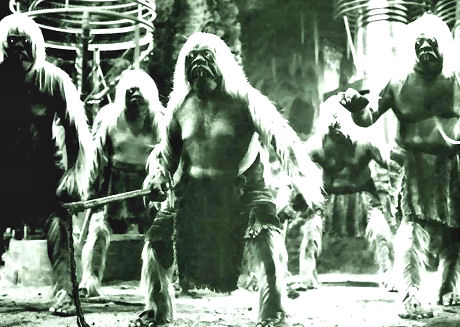If someone famous dies as a result of an external force or condition (car crash, drowning, lightning on golf course), journalists report it. If someone famous dies due to some common disease or affliction, journalists report it. But if someone famous dies due to the usual result of blatantly self-destructive behavior (like heavy cigarette smoking, black-coffee-drinking or relentless fatty-food-eating for decades), journalists don’t report it. In other words, if someone in effect commits a form of slow-motion suicide, journalists would rather not point this out. Update: I should have just spat out what I was told a day or two earlier, which was that the late John Hughes was (or had been) a heavy cigarette smoker and coffee drinker. Actions more often than not have consequences.
Day: August 10, 2009
South American Scuzballs
Dave McNary‘s Variety article about Triple Frontier, the next project for director Kathryn Bigelow and Mark Boal, said they;d be executive producing but declined to say in so many words if Bigelow will be directing. I’ve been told she in fact is attached to direct, which is basically a yeah-I’ll-probably-direct-but-I’d-rather-not-yet-sign posture.
The pic, being written by Boal, will be a crime drama he “set in the notorious border zone between Paraguay, Argentina and Brazil where the Igazu and Parana rivers converge — making ‘la triple frontera’ difficult to monitor and a haven for organized crime,” etc. None of which means anything about what kind of movie it might conceivably be. I don’t much like the title for the same reason — i.e., doesn’t convey anything.
Australian Sitdown

Actress Olya Zueva, who plays Angelina Jolie‘s mother in a ’70s flashback sequence in Phillip Noyce’s Salt (Sony, 7.10) — Sunday, 8.9.09, 8:40 pm. It was my contention that Olya is close to being a dead-ringer for Rachel Ward as she looked in the late ’70s. Certainly close enough.

Two bottles of Noyce Brothers vino that couldn’t be opened due to an upcoming tasting by wine guru Robert Parker.

Noyce’s longtime and much-trusted assistant Chris Nablo, a right guy who’s helped me out with this and that more than a few times — Sunday, 8.9.09, 7:55 pm.
Sommers!
In a q & a with Variety‘s Michael Fleming, G.I. Joe director and Morlock flunky Stephen Sommers blurted out the following comments:
(a) “I don’t think the mainstream critics are relevant [when it comes to G.I. Joe] — they have criticized themselves into irrelevancy. Transformers 2 got the worst reviews in the last decade, and it is the biggest hit of the year. More people will see that than any other movie. On my movie, it became so clear to us. Why not make those reviewers pay their $15 like everyone else?”
(b) “I’d shown it dozens of times, all around the world. The reaction has been overwhelmingly positive. Aside from doing close to $60 million, it got an A Cinema Score with people under 25. No matter what the critics say, the under 25 crowd is what’s most important.”
(c) “I know it sounds cliche, but I don’t read [reviews]. Why would I? I make the kind of movies critics love to hate. They love dark and depressing movies. If you make those, you expect they will love you, you need them to love you. The kind of movies I make? They don’t enjoy commercial or popular movies. I would say that geek love is hard to earn, and I got that in mounds. All the internet movie-haters love this movie. To win them over was something.”
Sommers sounds the way I expected him to sound. Like a polluting chemical plant owner or some sort of defensive Palinesque reactionary who talks in simple-minded us-vs.-them terms. Guys like Sommers are what that book, “When Good Things Happen to Bad People,” was all about.
Judd’s Rightie Agenda?
Seth Rogen, Judd Apatow‘s creative partner and all-around wing man, reportedly told an interviewer during the promo lead-up for Knocked Up that “we make extremely right-wing movies with extremely filthy dialogue.”
Rogen “was half-joking, of course, and it’s safe to say that you won’t see Apatow and his merry men at the next Christian Coalition fundraiser,” writes N.Y. Times Op-Ed columnist Ross Douthat. “But the one-liner got something important right. By marrying raunch and moralism, Apatow’s movies have done the near impossible: They’ve made an effectively conservative message about relationships and reproduction seem relatable, funny, down-to-earth and even sexy.
“No contemporary figure has done more than Apatow, the 41-year-old auteur of gross-out comedies, to rebrand social conservatism for a younger generation that associates it primarily with priggishness and puritanism.
“No recent movie has made the case for abortion look as self-evidently awful as Knocked Up, Apatow’s 2007 keep-the-baby farce. And no movie has made saving — and saving, and saving — your virginity seem as enviable as The 40-Year Old Virgin, whose closing segue into connubial bliss played like an infomercial for True Love Waits.
I know you look at the column, Judd, so I’ll just ask you straight-out — is this guy talking shit or have I been reading you wrong the whole time? I’ve always thought that a brainy Jewish comedy director-writer who’s into subversion and dick jokes would naturally be a pinko-lefty of some kind. That’s what you more or less are…right? A lefty? I just don’t know if I could handle hearing that you’re a closet conservative and that you’re friendly with Jon Voight.
I don’t presume this to be the case. I’d just like to hear from you personally that you’re cool and that you don’t, you know, belong to the NRA and play golf with Clint Eastwood (who, by the way, I personally like and is an excellent human being). I’m just mildly freaked by the possibility, no offense.
Check and Compare
In his latest Future of Classic posting, amctv.com columnist Bilge Ebiri points out several similarities between G.I. Joe: The Rise of Cobra and Trey Parker and Matt Stone‘s puppet-animated Team America: World Police. “There are so many similarities between the two movies that it’s almost impossible to keep track of them all,” Ebiri writes. On a scale of 1 to 10 how likely is it that G.I. Joe writers Stuart Beattie and David Elliot never saw Team America? Just asking.

Morlocks Are Feasting
So to recap, in the space of the last three days Bill Maher, Roger Ebert and N.Y. Times critic A.O. Scott have all deplored abundant indications of rank stupidity and infantilism among the general public — Maher addressing diminished or nonexistent political awareness levels and Ebert/Scott pointing to increasing popularity of idiot-level CG paintbox/dada movies and the kneejerk avoidance among the under-25s of films with even a smidgen of adult texture or provocation.

Which is what I’ve been bemoaning in no uncertain terms in this column for years, and which is entirely about my own personality and spiritual shortcomings and nothing to do with what’s actually happening out in the culture….right, naysayers?
As I stated yesterday, American moviegoing youths have essentially become Eloi. Scott paints an image of ticket-buyers as “mewling, incontinent little bundles of id with dirty minds and mouths — that’s pretty much what the major studios think of us.” Either way they’re seen as subjects for relatively easy manipulation and brain-washing by the junk-food-dispensing and junk-movie-dispensing Morlocks — i.e., corporate owners of movie studios, studio-chief henchmen, slash-and-profit producers like Joel Silver and Lorenzo di Bonaventura and (they’re all serving the same goal and the same gods) fast-food distributors.
Today’s Eloi are not lambs waiting to be led to the slaughter, as H.G. Wells and George Pal envisioned, but under-educated ADD pudge-bods looking for steady weekend slurps of cheap-drug highs. Nothing lasting or profound, mind, but tasty and dumbly enjoyable enough to create appetites and addictions.
“What kind of person constantly demands something new and yet always wants the same thing?,” Scott asks in his 12.7 article, titled “Spoon-Fed Cinema.” “A child, of course. From toddlerhood we are fluent in the pop-cultural consumerist idiom: Again! More! Another one! Children are ceaselessly demanding, it’s true; but they are also easily satisfied, and this combination of appetite and docility makes the child an ideal moviegoer.
“But since there are a finite number of literal children out there, with limited disposable income and short attention spans, Hollywood has to make or find new ones. And so the studios have, with increasing vigor and intensity, carried out a program of mass infantilization.

“A movie that people will go and see, almost as if they had no choice, is a safer business proposition than one they may have to bother thinking about. In this respect Transformers: Revenge of the Fallen is exemplary. It brilliantly stymies reflection, thwarts argument, arrests intelligent response. The most interesting thing about the movie — apart from Megan Fox‘s outfits, I suppose — is that it has made nearly $400 million domestically.
“There is nothing else to say. Any further discussion — say about whether it’s a good movie or not — sounds quaint, old-fashioned, passe. Get a clue, grandpa.
The new Hollywood climate is one in which “middle-aged actors and critically lauded directors look like extravagances rather than sound investments,” Scott concludes. “Forty is the new dead. Auteur is French for unemployed. The Hurt Locker — the kind of fierce and fiery action movie that might have been a blockbuster once upon a time — is treated like a delicate, exotic flower, released into art houses and sold on its prestige rather than on its visceral power.”
